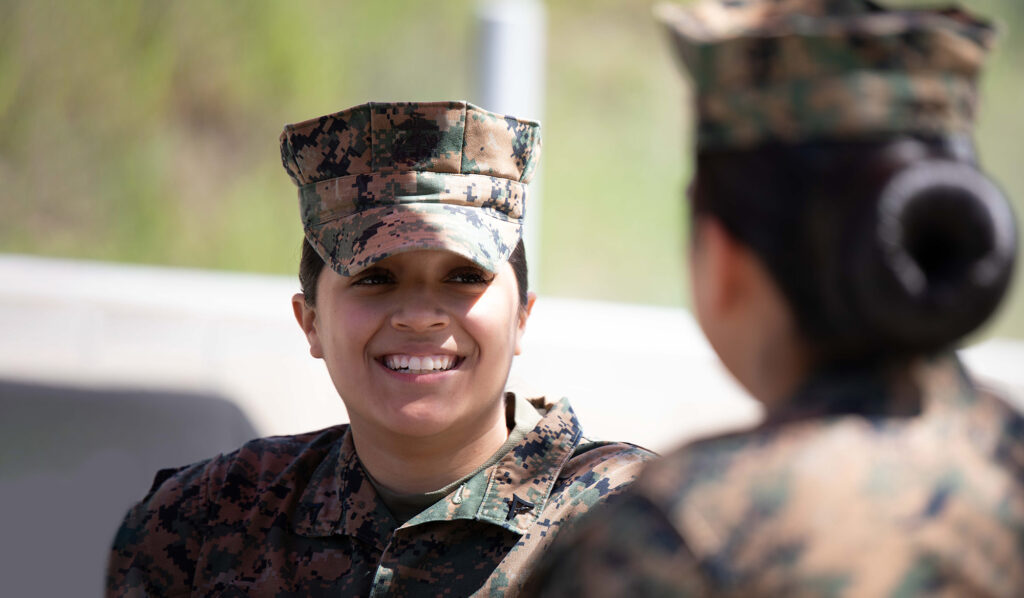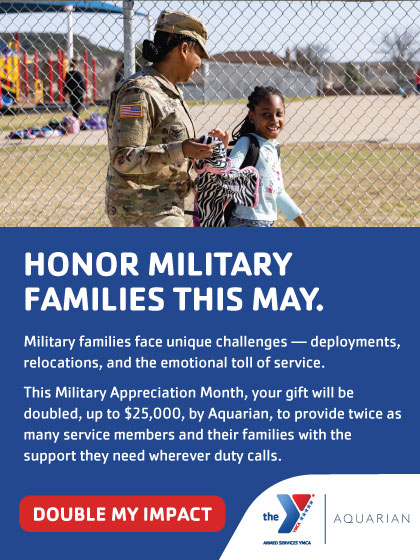Solo But Not Alone: Building a Military Community Overseas
Written by Poli Dimitrova
Much of the conversation around military life tends to focus on families: the spouse leaving behind a career, the kids saying goodbye to friends, the household adjusting to yet another move. But what is often left unsaid are the experiences of single service members — those who pack their bags alone and step onto the plane with no one waiting at the other end. They face the challenges of a new country, a new unit, and a completely different life without built-in support.
What often begins in uncertainty and solitude, though, can evolve into something greater: strength, growth, and connection. Below, we uncover real-life experiences and situations that single service members face when stationed overseas.
Initial Isolation
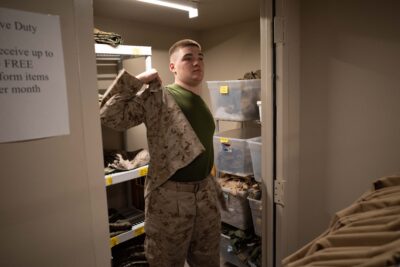
Landing in a new country may seem exciting at first — passport stamps, new places, different faces — but the thrill wears thin quickly. Street signs in another language, time zone differences that make it hard to call home, and barracks that offer little in the way of comfort or coziness soon set in.
For single service members, especially those arriving straight out of boot camp, that first overseas assignment can feel like being launched into another world. Fresh from training, often in their late teens or early twenties, they must jump straight into their work duties — sometimes in roles they are still learning — while simultaneously adjusting to a foreign country, a new unit, and an unfamiliar culture.
Unlike their married counterparts, who often arrive with spouses or families in tow, single troops step off the plane with little more than a duffel bag and a check-in list of appointments and tasks. But once those boxes are ticked off, the reality sets in: feelings of homesickness, navigating adulthood, learning the military lifestyle, and adjusting to a new country all at once can feel overwhelming.
Single service members interviewed all confirmed feeling “stressed and lonely” during their first few days after arrival.
Building Bonds in Unlikely Places
As soon as the initial shock of arrival fades, many single service members start looking for ways to fill their time. Connections form over shared challenges, long workdays, or even just a mutual love of a hobby. Weekend adventures become essential in a foreign land.
For some, friendships begin simply by going to the gym, showing up at a unit social event, or joining a sports club. These everyday moments may seem small, but they create the foundation for deeper, more meaningful relationships.
While barracks living and staying within the familiar base environment can feel safe and convenient, stepping outside and exploring off-base communities is just as important. Doing so opens the door to even more opportunities for friendship-building and creates a deeper sense of belonging in a new place.
“Don’t be afraid and do not isolate yourself — get off base, experience the culture, find a good group of friends with similar interests,” Alex, a Navy sailor, shares.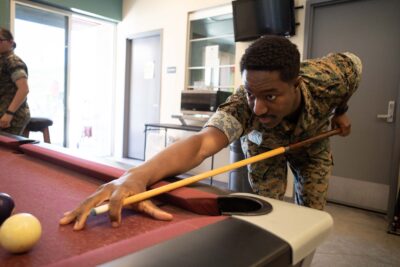 Single service members shared their favorite ways to build friendships while stationed overseas:
Single service members shared their favorite ways to build friendships while stationed overseas:
- Unit Social Events & Activities: Barbecues, sports tournaments, holiday gatherings, etc.
- Base Clubs & Interest Groups: Fitness classes, language exchange meetups, and more.
- Volunteer: Community service builds strong bonds.
- Join MWR Trips: Explore local markets, museums, and attractions.
- Use Technology: Social media and messaging apps make it easier to connect.
- Join a Team: Participate in on-basesports or recreational leagues such as softball, soccer, or running clubs.
- Take Classes or Workshops: Language, cooking, and art classes provide opportunities to meet others with similar interests.
Those who have already experienced being solo overseas remind newcomers: “To those just beginning this chapter: Do not stay on base, whatever you do. Travel as much as you can!”
Coping Strategies and Mental Wellness
Being stationed overseas without family nearby can take a toll on mental health. The pressures of military duties combined with the emotional weight of isolation and homesickness create a unique challenge for single service members. Finding strategies to maintain well-being and purpose despite the distance becomes essential.
Building Routines
Being far from home can be unsettling, but establishing a consistent daily routine can create a much-needed sense of normalcy. Whether it’s hitting the gym, cooking a meal, practicing self-care, or setting aside time for hobbies, these practices help reduce stress. Self-care can take different forms for everyone — from journaling and meditation to getting enough rest or enjoying a favorite book. Physical activity, in particular, has been proven to boost mood and resilience, making it a powerful tool in maintaining mental wellness.
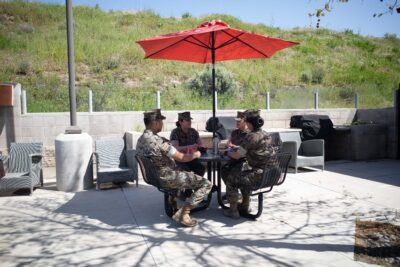
Staying Connected to Home and Community
Distance doesn’t have to mean disconnection. Not so long ago, service members stationed overseas relied on letters and postcards to keep in touch with loved ones back home — a process that could take weeks or even months.
Today, technology has completely changed the game. With smartphones, video calls, and social media, your family and friends are just a tap away — no matter how many miles separate you. These tools make it easier than ever to maintain close relationships, share daily moments, and support each other in real time.
Make the most of this digital era: schedule regular video calls, join group chats with friends and family, and share photos and videos of your new life. Staying connected not only eases homesickness but also strengthens the bonds that will welcome you back when your orders eventually bring you home.
Use the Resources Available
Mental health is a critical aspect of military life. Many service members face stress, anxiety, depression, or loneliness at some point during their careers, especially when stationed far from home. Despite its importance, the military culture often emphasizes strength, resilience, and self-reliance, which can make it difficult for some to discuss their struggles.
This stigma can lead to feelings of fear, leaving 60% of military personnel suffering in silence. But there is absolutely no shame in seeking help. Mental health challenges are common (1 in 4 active-duty members show signs), and asking for help is a sign of courage and strength — not weakness.
Fortunately, military installations offer a wealth of resources to support the emotional well-being of service members. Organizations like the Armed Services YMCA (ASYMCA) offer support groups, workshops, and social activities to help service members navigate the unique challenges of military life overseas. These resources can make a world of difference.
Unexpected Joys of Solo Life Abroad
While the challenges of being a single service member overseas are very real, many also discover unexpected joys and opportunities that come with solo life abroad. Without family responsibilities, single service members often find more time and freedom to explore, learn, and grow.
For some, this means embracing new hobbies or skills — whether it’s learning the local language, picking up a new sport, or focusing on their career. For others, it’s the chance to travel and see parts of the world they might never have visited otherwise.
Living solo also allows for a unique kind of self-discovery and independence. One Navy sailor admits, “I’ve learned to accept other cultures and beliefs, and it’s made me more curious to see what’s around the corner.” Two other service members shared how “being stationed overseas helped them become more confident and adaptable.” These qualities will serve them well both in and out of uniform.
Being stationed overseas as a single service member comes with a unique blend of challenges and growth. The initial isolation, the distance from family, and the pressure to adapt can feel overwhelming. While intimidating at first, there are ways to thrive in this environment. Discovering new strengths and returning home with greater confidence and self-awareness should be the ultimate goal.
“You will make friends, you will enjoy being there. You may arrive solo — but you won’t stay that way.”
Still unsure where to start? The ASYMCA supports junior-enlisted military personnel every step of the way, regardless of their location.

